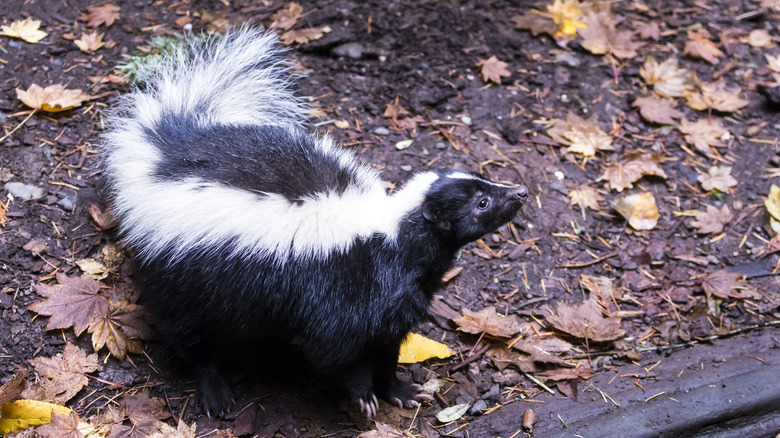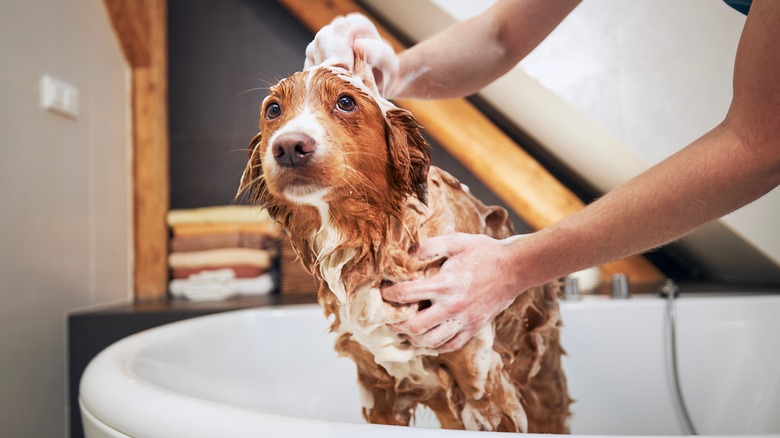Will Bleach Help Get Rid Of Stubborn Skunk Smells In Your Home?
Whether you catch a whiff from your car window, when finding a den under your shed, or after your curious (and unfortunate) dog gets sprayed, the smell of skunk is unmistakable and can often linger for days or even weeks. There are a few tricks for clearing out these odors, depending on what kinds of materials are affected. Cleaning agents like liquid soap, chlorine bleach, and hydrogen peroxide, as well as non-toxic acidic liquids like vinegar or lemon juice, can all help neutralize the smell. But bleach is perhaps the least desirable option.
Chlorine bleach does neutralize odors, but it has some downsides and may not be the best choice for many items. For starters, the chemical can remove the color from fabrics and may also weaken their fibers. The smell of bleach is also strong, and even after rinsing, the odor may remain. And take care when using it at home: This highly-concentrated substance can cause skin or eye irritation if not handled properly, and it's harmful to inhale bleach fumes in an unventilated area.
Hydrogen peroxide, present in oxygen bleach, works similarly to chlorine-based options for its disinfecting and deodorizing properties. The chemical doesn't leave lingering fumes and doesn't stain white fabrics (it can stain colored materials, though). In this way, it can be considered a slightly safer alternative than bleach for treating skunk-sprayed items. However, hydrogen peroxide can also cause skin and eye irritation, so it should be handled with care and used in a diluted solution.
White vinegar and lemon juice work best
Acidic cleaners are believed to help neutralize skunk spray odors by breaking down the organic compounds. One popular treatment long-thought to be effective for this purpose is tomato juice, but it has fallen out of favor because it's sticky to use and tends to stain fabrics or carpeting. White vinegar and lemon juice are less likely to blemish than tomato juice. Also, unlike lemon juice or tomato juice, vinegar's odor dissipates quickly once it has dried.
You can try using vinegar or lemon juice in tandem with using soap and water, depending on the surface affected. For carpets or upholstery, the best approach is to immediately treat the affected area with your solution followed by a mild soap and water cleaning if desired (and if recommended for the fabric or fiber content). For clothing, spot treat the item with vinegar or lemon juice, then soak the item in a solution of water and vinegar. Afterward, hand-wash the clothing item in soap and water or clean it by itself in the washing machine. If the skunk scent still lingers, spray the material with vinegar until it starts to lessen. Some fabrics retain odors longer than others: Synthetic options such as polyester, nylon, or fleece can be difficult in this regard.
If your dog is the source of the stink ...
If your dog is unlucky enough to get sprayed by a skunk, the first thing to do is make sure it didn't suffer any kind of injury or get sprayed in the eyes (call your veterinarian for guidance). But usually, the worst effect is the smell lingering on your pet's fur. The first thing to do is take a clean sponge soaked in white vinegar or lemon juice and dab the affected area, making sure to soak it, then wipe it off with clean paper towels.
Bathing your dog, or washing your dog in the shower, is the next step to removing the skunk smell. Use a mild citrus soap such as Dr. Bronner's, which is safe to use on your dog. The citrus ingredients help neutralize odors. You can also make a diluted solution of equal parts white vinegar, lemon juice, and water, and pour it over your dog in the bath, rubbing it into their fur before rinsing it off. Just be careful to avoid getting lemon juice or vinegar in your animal's eyes.
Use old towels when bathing your dog, as the skunk smell may linger even after a rinse, and you might have to dispose of them. You may need to bathe your pet more than once, particularly if they have long or thick fur. In some cases, if the smell lingers badly, you may need to have the affected fur shaved or cut short to remove the scented hair.


